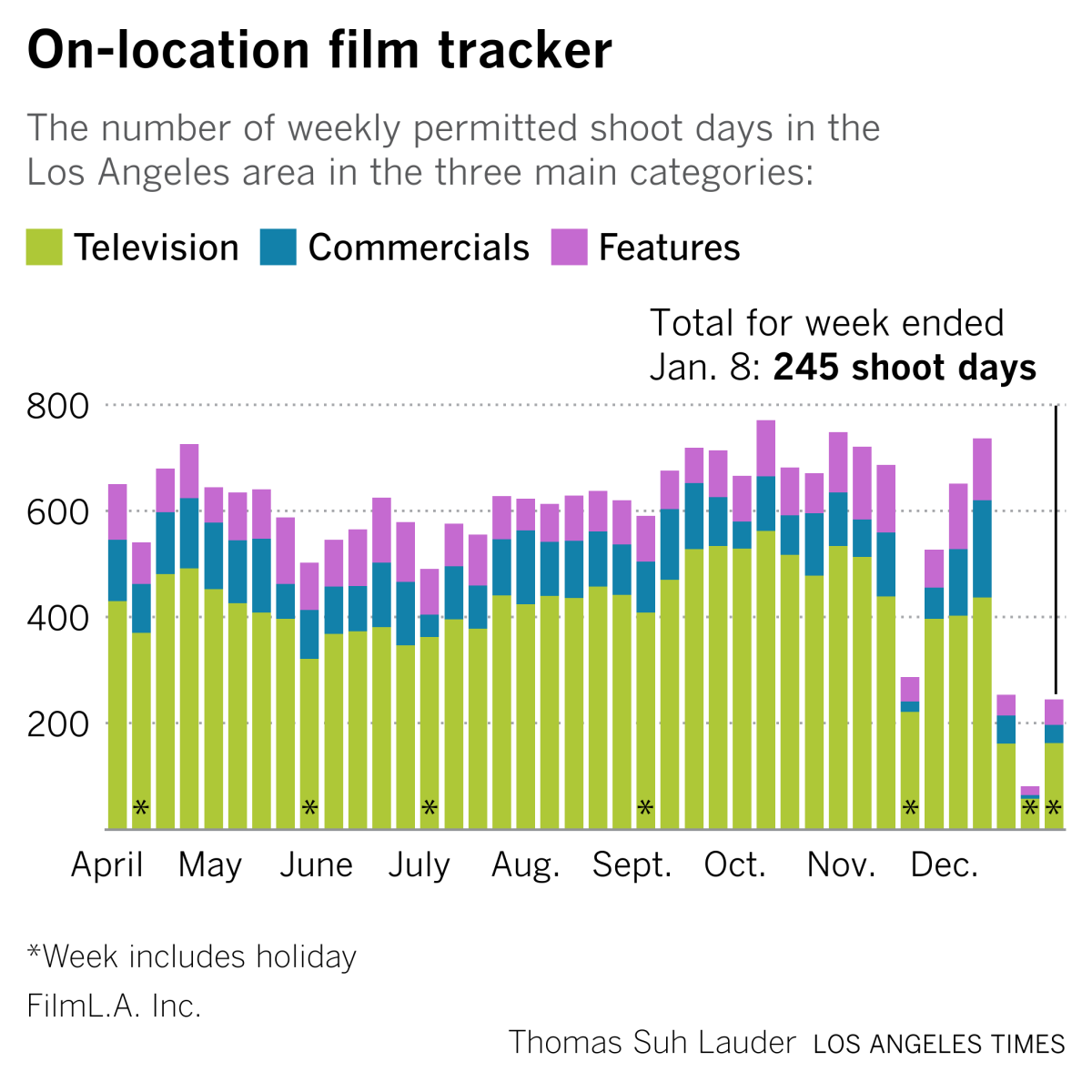Itâs 2023. What will become of these Hollywood trends and habits in the new year?

Welcome to the Wide Shot, a newsletter about the business of entertainment. Sign up here to get it in your inbox.
We made it, everyone. Itâs the first Wide Shot newsletter of 2023. Last week was very slow, unless you were WWE majority owner Vince McMahon, who is staging a return to the company after a scandal in order to pursue a sale (possibly to Comcast?).
The Globes are back in town
Tonightâs the night. The Golden Globes return to NBC, after a chaotic journey to recovery from a 2021 Times investigation that highlighted a lack of diversity in the organizationâs membership and raised concerns about its ethics and financial practices.
The Tuesday night broadcast arrives with a challenging dual mandate: to showcase the Hollywood Foreign Press Assn. as a reformed and more professional organization while regaining its status as the film and TV businessâs party of the year.
Billionaire investor Todd Boehly, who now serves as interim chief executive, knows he wonât be able to make 100% of the people happy after the industry-wide shunning of the HFPA. But publicists who led the boycott are generally supportive of the groupâs internal changes, according to a walkup piece by Times writers Josh Rottenberg, Stacy Perman and Glenn Whipp. And they have an incentive to be. Their clientsâ films, at least the headier Oscar bait-y ones, need all the help they can get from awards season.
Questions remain. Thereâs the ratings problem, as other awards shows face the same pressures when it comes to viewership. Also, the HFPAâs transformation is far from complete. The group is awaiting approval from Californiaâs attorney general on a plan to transform the nonprofit association into a for-profit venture.
âI have nightmares where it doesnât work too,â Boehly told Perman last month. âYou canât convince all the people all the time of anything. I appreciate that thereâs skepticism. But I would say, âCome and check it out and see for yourself.ââ
Diving into 2023
For many, January is a month for reconsidering old habits and self-destructive behaviors. As the entertainment industry creaks into the new year, hereâs a warning, a resolution and a plea for the business of TV and movies.
Layoffs and purges
The prospects of a soft landing for entertainment, media and tech workers look slim in what Scott Galloway of New York University has labeled a âPatagonia vest recession,â referring to industries that went wild with spending during the COVID-19 pandemic and are now suffering financial whiplash.
Swaths of executives mistook the changes in consumer behavior as permanent rather than temporary adaptations to an extraordinary circumstance and have been dealing with the fallout. The pain has been felt by employees and creative types at a time when the economy is teetering.
Warner Bros. Discovery laid off droves of people in pursuit of $3.5 billion in cost savings and snuffed high-profile programming for tax write-offs and savings on royalties. Netflix shed workers. Amazon is axing 18,000 jobs from departments including HR and stores. Bob Iger kept Disneyâs hiring freeze in place. AMC Networks scrapped shows it had already ordered. Paramount+ killed its âWorkaholicsâ movie five weeks before production was scheduled to start.
Gunnar Wiedenfels, Warner Bros. Discoveryâs chief financial officer, said last week at an investor conference that the era of writing off huge volumes of content is over, at least for his company. âWeâre done with that chapter,â Wiedenfels said. The write-offs were âa reflection of an industry that went overboard and went on a spending frenzy,â he said. He also said streaming services are priced too low, so get ready to pay more.
As UTA head Jeremy Zimmer put it in an interview with Recodeâs Peter Kafka, buyers arenât scrimping on individual shows by, say, moving âThe White Lotusâ to Cleveland from Sicily. Theyâre just making less stuff.
Executives may be eager to put the chaos of 2022 behind them. But thatâs not so easy. The cancellations and cost-cutting measures are sure to play a role in labor negotiations between writers and studios this year. Networks canceling shows isnât new, but the trend of scrapping programs after their season renewals and during or after production is a disturbing one for creatives.
Overestimating estimates
If the enduring performance of âAvatar: The Way of Waterâ proves anything (beyond James Cameronâs ability to defy long odds), itâs that judging a filmâs performance by whether its opening weekend box office missed or exceeded pre-opening forecasts is â at best â flawed.
After a $134-million domestic debut weekend, hampered by severe winter storms, was widely labeled a tepid start, the movie just kept going and is now 2022âs biggest blockbuster, with more than $1.7 billion in global ticket sales.
Cameron didnât exactly help himself in the expectations department. Where most people would tamp down predictions, he implied that the âAvatarâ sequel would have to hit around $2 billion to be considered a success. Whether âThe Way of Waterâ hits that bar or not, itâs making money for Disney, and worries about the filmâs cultural impact can now be cast from the airlock into outer space.
Measuring results against expectations is a simple and technically objective way to gauge performance. The problem is that pre-weekend box office forecasts are based not on studioâs own targets for what the movie needs to do to turn a profit but on audience surveys that determine the moviegoing publicâs awareness and interest in any given title.
Box office tracking is a helpful exercise for studios looking to evaluate their marketing campaigns. Itâs less useful when determining what really matters â profitability. The obsession with forecasting is how audiences might reasonably get the impression that âHalloween Endsâ missed targets, though it was definitely profitable, while âBlack Adamâ hit expectations.
Profitability is sometimes difficult to determine accurately and is subject to studio spin. Just look at the spectacle of dueling trade stories about whether âBlack Adamâ made money, a discussion ultimately rendered moot by Warner Bros.â decision to not do a sequel.
Better data, please
There was more streaming data than ever in 2022. However, weâre still waiting for a comprehensive, broadly accepted measurement system for steaming shows and movies, leaving analysts to make sense of disparate figures from streamers and third parties.
Netflixâs own hours-viewed metrics are useful for comparing the companyâs shows with each other, though putting them in context is challenging (longer shows have an advantage in the rankings, for example).
Nielsenâs weekly top 10 lists are interesting documents of relative popularity (kudos, âWednesdayâ). But the measurement giant includes viewing only on actual TV screens, which is incomplete. The firmâs charts are also delayed by several weeks, limiting their utility in a world where programming slips out of the zeitgeist in a matter of days.
Then there are the other players in the data wars: Parrot Analytics, with its calculations of âdemandâ; Antenna, which measures âchurnâ; ReelGood, with its own weekly charts based on its search system.
With all that, we have a pretty good idea of whatâs a hit and whatâs not, which is better than staring into a black box. But some streamers remain content to declare that the latest show was the âmost watchedâ premiere on the platform without giving actual data.
The argument against disclosing better ratings data was once that the companies didnât need to disclose it because they werenât relying on commercials. Thatâs no longer the case. Hereâs hoping the streaming industryâs greater acceptance of ads leads to a more intelligible system for measuring audiences.
Stuff we wrote
â With pandemic and streaming boom, mental health support is coming to some film sets. Productions in the U.K. and the U.S. are seeing more focus from mental health advocates.
â Despite turmoil at CNN, Chris Wallace is still âTalking.â Wallace discusses the second season of his in-depth interview program on HBO Max and CNN.
â Roku TVs are coming to market. Will they help the San Jose streamer rebound? Roku on Wednesday announced it would make its own branded TVs as it faces rising competition and a possible recession.
â Legal dispute with financiers of âTop Gun: Maverickâ casts spotlight on controversial Russian oligarch. A lawsuit filed against New Republic Pictures alleges controversial Russian oligarch Dmitry Rybolovlev is the âsilent partnerâ behind a slate of Paramount blockbusters, raising questions about the companyâs financing.
â These historic works are coming free from copyright. Why did it take so long? The cherished works from 1927 losing their copyright protection include the film âMetropolis,â a classic Laurel and Hardy short and the first Hardy Boys book, in a New Yearâs bounty from our convoluted system.
â ICYMI: Bob Iger orders Disney employees back to the office four days a week. Video game workers form Microsoftâs first U.S. labor union. Former Hollywood Reporter publisher Robert Dowling dies at 83. Disney vs. Florida âDonât Say Gayâ feud advances with new proposed legislation. The Times podcast: 2022 in culture: Bad Bunny, the slap and more. Another Joe Rogan goof.
Number of the week

With little competition other than the four-week-old âAvatar 2,â Universalâs freaky, highly meme-able doll movie âM3GANâ grossed a strong $30.2 million at the domestic box office. The horror film was produced by Jason Blumâs Blumhouse and James Wanâs Atomic Monster, and âM3GANâsâ success bodes well for the proposed merger of these two horror companies. Itâs a strong start for the 2023 box office, with revenue up 39% year-to-date from last year, according to Comscore.
Runner up: 76%
Blame TikTok, streaming and YouTube for the decline of kids TV. Since 2017, prime-time kidsâ television viewership has fallen 76%, according to Variety, faster than other categories of programming.
Best of the web
- Two stories suggesting that the podcast industry is in for a rough 2023.
- Bloomberg says the business is headed for a market correction.
- Vulture took the temperature of a bunch of anonymous podcast folks. Theyâre sick of true crime too.
- Why Xi Jinping reversed his zero-covid policy in China. (Wall Street Journal)
- TikTokâs addictive anti-aesthetic has already conquered culture. (L.A. Times)
- âM3GANâ star Allison Williams comes alive in this fresh profile. (Vulture)
- Belarus (sort of) legalizes piracy in the wake of U.S. sanctions. (Gizmodo)
- The race to build Taylor Sheridanâs âYellowstoneâ universe â while spending $22 million an episode on â1923.â (WSJ)
Films shoots
Yeah, there wasnât much production activity over the holidays.

Finally ...

2022 was the year when Hollywood tried to have it both ways with eat-the-rich revenge narratives, by letting audiences bask in the wish fulfillment of luxurious getaways while watching the 1% eat one another alive in various reverse-âLord of the Fliesâ scenarios.
Anyone who watched âThe Menuâ on HBO Max and âGlass Onionâ on Netflix in quick succession (pun intended) â especially after the finale of HBOâs âThe White Lotusâ â surely noticed that weâre in a particular moment of interrogating our billionaire worship problem.
I enjoyed all three. Both âGlass Onionâ and âThe Menuâ set up their characters as easily identifiable types â the annoying foodie, the menâs rights personality, the influencer â and then knock them down with varying degrees of precision.
The satire could often be sharper, as Richard Lawson argued in a recent Vanity Fair piece. Lawson wants a more merciless takedown of these characters than the filmmakers are willing to deliver with their socially conscious comedy. Alas, perhaps a truly devastating critique of capitalism is too much to expect.
âOne can hope, all the while aware of a nasty little catch-22,â Lawson wrote. âIn order to make a movie that strips emperors down to their pathetic nakedness, those same rulers need to be hit up for money.â
Bonus track: David Ehrlichâs musical video essay counting down the best films of the year is one of the best things of every year.
Inside the business of entertainment
The Wide Shot brings you news, analysis and insights on everything from streaming wars to production â and what it all means for the future.
You may occasionally receive promotional content from the Los Angeles Times.




